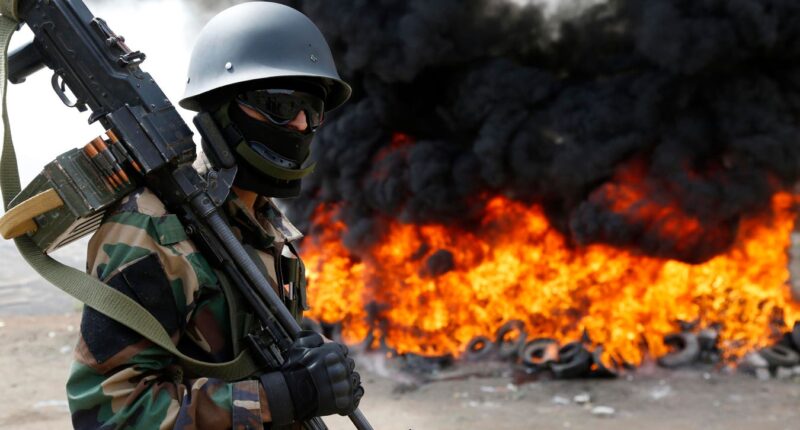Share this @internewscast.com
A Yemeni security member guards during a destruction of narcotic drugs, seized in past 6-month of … More
Getty Images
Israel has once again executed long-range airstrikes targeting ports in Houthi-controlled parts of Yemen in an attempt to pressure the group economically. However, as with preceding airstrikes over the past year, this latest attack did not deter the Houthis from retaliating by firing ballistic missiles at Israel. Consequently, some in Israel believe it needs to adopt a different strategy to economically pressure the group, such as targeting its drug production.
Overnight July 6-7, 20 Israeli fighter jets dropped over 50 munitions on key Yemeni ports, including Hodeidah and the Ras Khatib power station. The jets also targeted the Galaxy Leader, a commercial vessel the Houthis hijacked back in November 2023.
The Houthis again attempted to hit Israel’s Ben Gurion Airport with a ballistic missile in response as part of what it called a “qualitative military operation” on Thursday. Israel’s air defense foiled that attack. The Houthis also sank two commercial vessels in the Red Sea, actions that do not suggest that Israeli airstrikes are deterring them. They have repeatedly declared that they will only cease targeting Israel once there is a ceasefire in Gaza.
Since the Israeli Air Force first targeted the Houthis in July 2024 in retaliation to a fatal drone strike on Tel Aviv, it has invariably bombed economic-related targets in a bid to pressure the Houthis to relinquish their attacks.
Interestingly, the Israeli newspaper Israel Hayom highlighted the Houthis involvement in the Captagon drug trade following Israel’s latest strikes, hinting that it could become a future target for Israel.
Dubbed the “poor man’s cocaine,” Captagon is an “amphetamine-type stimulant” that was widely smuggled across the region, particularly Saudi Arabia and the wealthy Arab Gulf countries, by the former regime of Bashar al-Assad in Syria. The sale of Captagon made up the vast majority of the Assad regime’s income in the latter years of its rule, effectively turning Syria into a narco-state.
Caroline Rose, the director of the Crime-Conflict Nexus and Military Withdrawals portfolios at the New Lines Institute, has conducted diligent research on the Captagon trade in the Mediterranean and Persian Gulf regions and briefed governments and intelligence agencies on the topic.
“It’s clear that there has been a shift in Captagon trafficking through Yemen, though the volume of traffic still is largely along Saudi Arabia’s border with Jordan and via major maritime ports,” Rose told me.
“There is most certainly an economic incentive for criminal and armed actors, such as the Houthis, to try and exploit this new ‘vacuum’ in production that was left behind by the Syrian regime, taking advantage of a slight increase in pill prices,” she said. “However, I don’t expect that actors in Yemen have the capacity to build up production operations to the level of what we’ve seen seized in Douma, Yarfur, Mazzeh, Latakia, and other former regime-held areas.”
Border authorities in Yemen announced in June that they had busted an attempt to smuggle 1.5 million pills from Yemen’s Houthi-controlled capital city, Sanaa, to Saudi Arabia.
Mohammed Al-Basha of the Basha Report, a Virginia-based Risk Advisory, noted that “the first confirmed evidence” of Captagon production in Yemen was revealed in Yemen in June by the Security Director of Aden, General Mutahar Al Shuaibi. Unlike Sanaa, the port city of Aden remains under the control of Yemen’s internationally recognized government.
“According to Al Shuaibi, intelligence sources identified a Captagon manufacturing facility located in the Houthi-controlled Mahweet governorate,” Al-Basha told me. “He likened the site to drug factories previously uncovered in Syria and urged Saudi Arabia to provide immediate support in combating the rapidly growing drug trade. He warned that Yemen has become a key transit corridor for narcotics flowing into Saudi Arabia.”
“Given the high level of security in Houthi-held areas, such a facility could not be operating without the Houthis either deliberately ignoring it or actively profiting from it.”
New Line’s Rose estimates that the Captagon trade in Yemen remains “quite small” compared to other hubs for production and trafficking in the region. However, she wouldn’t rule out Israel “seeking to double down” on whatever evidence of drug smuggling or production it can find, noting that recent Israeli press articles “indicate a baseline interest and intrigue” in the illicit Houthi drug trade.
“I think that after such a concerted effort by Israel, the U.S., and partner countries to degrade Houthi capabilities (and largely unsuccessfully) over the last two years, it’s possible that Israel could deem any Houthi facility or asset suspected of being used for drug production/trafficking as a military target,” she said.
The potential targeting of another drug industry in Yemen has already been suggested in a January 2025 article in the Israeli newspaper Haaretz. Yossi Melman, the paper’s intelligence and strategic affairs correspondent, highlighted the “treasured habit” of chewing Khat leaf in Yemen, which also gives the consumer an amphetamine effect. He suggested that targeting Khat crops could become a “game changer” against the Houthis. However, he also noted that similar American efforts to destroy coca crops by air in Colombia utterly failed.
“In Yemen, since khat is mainly for personal use at home, there is a chance that if the people are deprived of the leaf, they may rebel against the Houthi leadership, which might be forced to come to terms with Israel: Stop destroying khat crops in exchange for halting the missile fire on Israel,” Melman wrote.
Of course, none of this necessarily means Israeli fighters will soon end bombing runs against Yemeni ports in favor of dropping bombs or defoliant on Yemen’s Khat crops.
Al-Basha doubts such a move would “alter the Houthis’ mindset,” noting that the group “withstood” eight years of Saudi-led bombing and the more recent 51-day American Rough Rider air campaign earlier this year.
Additionally, any serious attempt to destroy Yemeni Khat production could ultimately backfire.
“In theory, targeting Khat farms may disrupt parts of the local economy, but Khat remains a key cash crop supporting the livelihoods of hundreds of thousands,” Al-Basha said.
“Damaging this source of income may only drive more people into the arms of the Houthis, both as a means of economic survival and as retaliation.”










